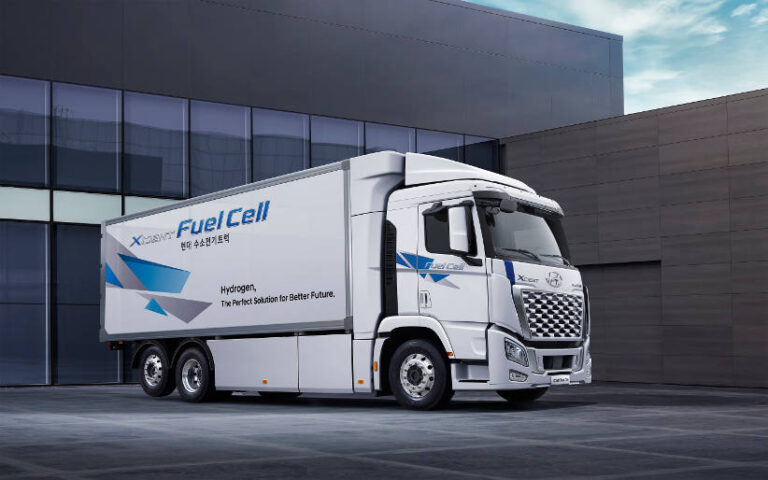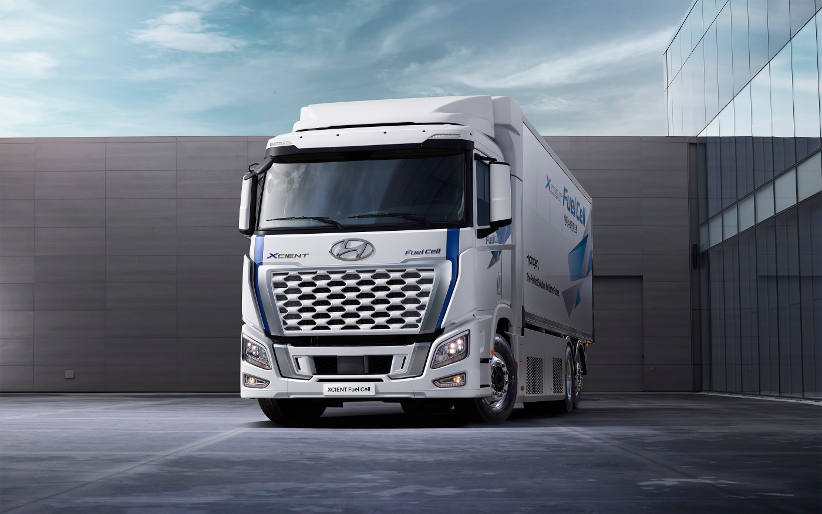Fleets around the world will soon have access to a mass-produced hydrogen powered truck. Hyundai has upgraded the XCIENT Fuel Cell truck and will offer two variants to fleets customers and transport companies. The improved styling, range and power, Hyundai will begin production in August 2021.
Hyundai delivered 46 XCIENT Fuel Cell trucks to Switzerland last year and they have performed so well that another 146 will be shipped in 2021. It’s the first step to having 1,600 heavy duty hydrogen powered vehicles in Europe by 2025.
“Hyundai Motor is leveraging more than 20 years of experience in fuel cell technology to further its vision of an eco-friendly hydrogen society,” said Jaehoon (Jay) Chang, CEO and President of Commercial Vehicle Division at Hyundai Motor Company. “With 2021 XCIENT Fuel Cell, Hyundai will contribute to the widespread adoption of commercial vehicles powered by hydrogen.”
Better driving experience with improved design and performance
Hyundai has upgraded both the design and performance of XCIENT Fuel Cell, adding to its competitive edge for a better driving experience.
The updated exterior design expresses XCIENT Fuel Cell’s dynamic and eco-friendly performance. Decorated with a linear and bold ‘V’ shape of chrome details and multi-dimensional mesh patterns, the new radiator grille reflects the high-tech fuel cell electric truck’s unrivalled presence on the road, while serving its own technical function. The blue point colour surrounding the grille and the decal graphics vividly visualizes XCIENT Fuel Cell’s use of eco-friendly hydrogen energy.
2021 XCIENT Fuel Cell is equipped with a 180kW hydrogen fuel cell system with two 90kW fuel cell stacks, newly modified for this heavy-duty truck model. The fuel cell system’s durability as well as the vehicle’s overall fuel efficiency has been improved to better stay in tune with the demands of commercial fleet customers. The 350kW e-motor with maximum torque of 2,237Nm further enables dynamic driving performance.
Seven large hydrogen tanks offer a combined storage capacity of around 31kg of fuel, while three 72kWh high voltage batteries provide an additional source of power. The maximum driving range of 2021 XCIENT Fuel Cell is set to be around 400 km. Refueling a full tank of hydrogen takes about 8 to 20 minutes, depending on the ambient temperature.
2021 XCIENT Fuel Cell is now available in a 6×2 rigid body configuration as well as the 4×2 option introduced in the previous model.
XCIENT Fuel Cell hitting the roads in Europe, North America, and China
With the launch of the enhanced model, Hyundai plans to accelerate the global advancement of its heavy-duty fuel cell truck.
Hyundai shipped a total of 46 units of XCIENT Fuel Cell to Switzerland last year. As of May 2021, the cumulative driving range of those trucks in operation reached over 750,000 kilometres. Over that distance, the hydrogen-powered trucks have reduced carbon emissions by an estimated 585 tons, compared to diesel-powered vehicles.
Hyundai will ship another 140 units of the new XCIENT Fuel Cell towards Switzerland by the end of this year as part of its plan to roll out 1,600 heavy-duty fuel cell electric trucks in Europe by 2025. Hyundai Hydrogen Mobility, a joint venture between Hyundai Motor and H2 Energy, is working on the introduction of XCIENT Fuel Cell in other European markets.
“The customers are very pleased with the quality and driving comfort of the truck. There is a lot of interest for the truck outside Switzerland as well. We are very confident that we will see XCIENT Fuel Cell trucks on the road in other European countries next year,” says Mark Freymueller, CEO of Hyundai Hydrogen Mobility.
Hyundai also plans to present XCIENT Fuel Cell to the North American market this year. Hyundai is in talks with several local governments and logistics businesses in the U.S. to establish potential joint operations of hydrogen-powered trucks for various purposes. The company is also planning to host XCIENT Fuel Cell roadshows and other events open to the general public.
China is another nation that has strong interest in heavy-duty trucks powered by hydrogen. Hyundai is carefully reviewing multiple options to introduce its fuel cell technology to corporate and government customers in China.
2021 XCIENT Fuel Cell Specifications
|
|
|
2021 XCIENT Fuel Cell |
|
|
Item Model |
|
4×2 Cargo |
6×2 Cargo |
|
Vehicle Type |
|
Cargo |
Cargo |
|
Cab Type |
|
Day Cab |
Day Cab |
|
Drive System |
|
LHD / 4×2 |
LHD / 6×2 |
|
Dimensions [mm] |
|
|
|
|
Wheel Base |
|
5,130 |
5,000 + 1,350 |
|
Overall (Chassis Cab) |
|
|
|
|
|
Length |
9,745 |
9,745 |
|
|
Width |
2,540 (with side protector. EU & Switzerland) |
2,540 (with side protector. EU & Switzerland) |
|
|
Height |
3,730 (with Standard Spoiler) 3,900 (with add-on spoiler) |
3,730 (With Standard Spoiler) 3,900 (with add-on spoiler) |
|
Weight [kg] |
|
|
|
|
Max. Gross Vehicle Weight |
19,500 |
27,500 |
|
|
|
Front / Rear |
8,000 / 11,500 |
8,000 / 11,500 + 8,000 |
|
Max. Gross Combination Weight |
36,000 |
40,000 |
|
|
Calculated Performance |
|
|
|
|
Max. Speed |
|
85 km/h |
85 km/h |
|
Powertrain |
|
|
|
|
Fuel Cell Stack |
180 kW (90 kW x 2 EA) |
180 kW (90 kW x 2 EA) |
|
|
Battery |
|
630 V / 72 kWh |
630 V / 72 kWh |
|
Motor |
350 kW / 2,237 Nm |
350 kW / 2,237 Nm |
|
|
Transmission |
|
Allison ATM (6 speed) |
Allison ATM (6 speed) |
|
Hydrogen Tank |
|
|
|
|
Capacity (Useable) |
|
31 kg H2 (available hydrogen amount at SOF 100%) |
31 kg H2 (available hydrogen amount at SOF 100%) |
|
Brake |
|
|
|
|
Service Brake |
|
Disc |
Disc |
|
Auxiliary Brake |
|
Retarder + Regenerative |
Retarder + Regenerative |
|
Suspension |
|
|
|
|
Type |
Front / Rear |
Air Spring |
Air Spring |
|
Tires |
Front / Rear |
315/70R22.5 |
315/70R22.5 |
|
Feature |
|
|
|
|
Front Collision-avoidance Assist (FCA) |
Standard |
Standard |
|
|
Smart Cruise Control (SCC) |
Standard |
Standard |
|
|
Electronic Braking System (EBS) & |
Standard (ABS is included in VDC) |
Standard (ABS is included in VDC) |
|
|
Vehicle Dynamic Control (VDC) |
|||
|
Lane Departure Warning (LDW) |
Standard |
Standard |
|
|
Driver’s Airbag |
|
Standard |
Standard |
|
Motor Assist Hydraulic Steering (MAHS) |
Option |
Option |
|
*NOTE: Specifications and equipment may be changed without prior notice.
1 XCIENT Fuel Cell is developed based on the hydrogen filling pressure of 350 bar.
2 The number is calculated based upon the data that a diesel-powered truck that is same class with XCIENT Fuel Cell emits an average of 0.78kg of carbon dioxide per kilometre.








